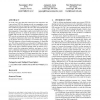Free Online Productivity Tools
i2Speak
i2Symbol
i2OCR
iTex2Img
iWeb2Print
iWeb2Shot
i2Type
iPdf2Split
iPdf2Merge
i2Bopomofo
i2Arabic
i2Style
i2Image
i2PDF
iLatex2Rtf
Sci2ools
IMC
2006
ACM
2006
ACM
Malware prevalence in the KaZaA file-sharing network
In recent years, more than 200 viruses have been reported to use a peer-to-peer (P2P) file-sharing network as a propagation vector. Disguised as files that are frequently exchanged over P2P networks, these malicious programs infect the user’s host if downloaded and opened, leaving their copies in the user’s sharing folder for further propagation. Using a light-weight crawler built for the KaZaA file-sharing network, we study the prevalence of malware in this popular P2P network, the malware’s propagation behavior in the P2P network environment and the characteristics of infected hosts. We gathered information about more than 500,000 files returned by the KaZaA network in response to 24 common query strings. With 364 signatures of known malicious programs, we found that over 15% of the crawled files were infected by 52 different viruses. Many of the malicious programs that we find active in the KaZaA P2P network open a backdoor through which an attacker can remotely control...
| Added | 13 Jun 2010 |
| Updated | 13 Jun 2010 |
| Type | Conference |
| Year | 2006 |
| Where | IMC |
| Authors | Seungwon Shin, Jaeyeon Jung, Hari Balakrishnan |
Comments (0)

